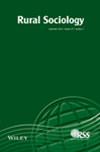A Guide to the American Community Survey (ACS) for the Rural Researcher: Unpacking the Conceptual and Technical Aspects of Using Secondary Data for Rural Research☆
IF 1.9
3区 社会学
Q2 SOCIOLOGY
引用次数: 0
Abstract
Sparsely populated rural areas are susceptible to high levels of error in their data, making it difficult to examine patterns and trends across geographies. This article aims to advance research methods for rural researchers by offering guidelines for navigating high levels of error associated with the American Community Survey (ACS). The ACS presents a useful source of U.S. community level data for rural researchers to utilize in school–community research but not without its difficulties. The small population sizes of rural communities often translate to large margins of error in the data, presenting a degree of uncertainty in the actual measure. To illustrate challenges and best practice, the author conducts a case study of the relationship between the presence of schools and economic vitality of rural communities in Indiana using ACS data. The author demonstrates how to examine the error in the data, introduces options to reduce uncertainty, and ultimately, explains how to move forward with the data, working with the margin of error and acknowledging its presence in the analysis and results. This article offers suggestions and techniques to assist rural researchers in navigating ACS obstacles so that they might produce transparent results with as little uncertainty as possible.

美国社区调查(ACS)农村研究员指南:解开农村研究中使用二手数据的概念和技术方面的问题
人口稀少的农村地区的数据容易出现高水平的误差,因此很难检查跨地域的模式和趋势。本文旨在通过提供指导方针,为农村研究人员提供与美国社区调查(ACS)相关的高水平误差导航,从而推进研究方法。ACS为农村研究人员在学校-社区研究中提供了一个有用的美国社区数据来源,但并非没有困难。农村社区人口规模小,往往导致数据误差较大,在实际测量中存在一定程度的不确定性。为了说明挑战和最佳实践,作者使用ACS数据对印第安纳州农村社区的学校存在与经济活力之间的关系进行了案例研究。作者演示了如何检查数据中的错误,介绍了减少不确定性的选项,并最终解释了如何继续使用数据,处理误差范围并承认其在分析和结果中的存在。本文提供了建议和技术,以帮助农村研究人员在导航ACS障碍,使他们可能产生透明的结果,尽可能少的不确定性。
本文章由计算机程序翻译,如有差异,请以英文原文为准。
求助全文
约1分钟内获得全文
求助全文
来源期刊

RURAL SOCIOLOGY
SOCIOLOGY-
CiteScore
4.60
自引率
13.00%
发文量
47
期刊介绍:
A forum for cutting-edge research, Rural Sociology explores sociological and interdisciplinary approaches to emerging social issues and new approaches to recurring social issues affecting rural people and places. The journal is particularly interested in advancing sociological theory and welcomes the use of a wide range of social science methodologies. Manuscripts that use a sociological perspective to address the effects of local and global systems on rural people and places, rural community revitalization, rural demographic changes, rural poverty, natural resource allocations, the environment, food and agricultural systems, and related topics from all regions of the world are welcome. Rural Sociology also accepts papers that significantly advance the measurement of key sociological concepts or provide well-documented critical analysis of one or more theories as these measures and analyses are related to rural sociology.
 求助内容:
求助内容: 应助结果提醒方式:
应助结果提醒方式:


